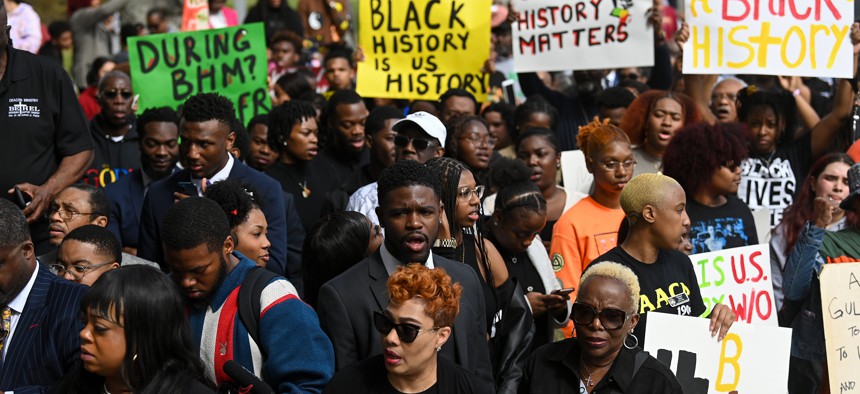Black History Is Everyone’s History

Joshua Lott/The Washington Post via Getty Images
COMMENTARY | How does an incomplete, inaccurate education omitting Black contributions serve society?
Black History Month may be over, but Black history continues to feature heavily in Florida Gov. Ron DeSantis' cynical, mean-spirited political stratagems.
The governor has weaponized Black history for some time in his still unofficial presidential bid. Most notably with the signing into law of the dog-whistle-heavy Stop WOKE Act last year, which forbids teaching A.P. African American studies in Florida classrooms. And more recently with hand-picking New College of Florida trustees, who recently voted to dismantle that institution's diversity, equity and inclusion (DEI) programs.
But we give DeSantis too much credit if we frame the struggle over Black history as his personal hobby horse. The effort to hide the truth of Black people's history is older than the nation itself. The governor has only hitched his wagon to it.
Over several years, lawmakers seeking to reverse decades of progress have moved aggressively to ban, repress, or outlaw the novels, scholarship, and curricula produced by Black, queer, and other marginalized communities. The excuses politicians like DeSantis, Iowa Gov. Kim Reynolds, Texas Gov. Greg Abbott and Virginia Gov. Glenn Youngkin, give range from questioning these materials’ educational value to decrying a perceived “political agenda.”
But how does an incomplete, inaccurate education omitting Black contributions serve society?
For far too long, Black people’s vast contributions were sidelined in the U.S. history canon—scantily taught during the month of February. Integrating African American studies as a discipline into that canon benefits us because telling the truth about our country, both past and present, is vital to building a more perfect union.
If they were honest, policymakers seeking to quash such curricula would admit that teaching the extraordinary history of Black people requires young people to also learn the history and continued legacy of White racial terrorism. It requires the children of White families to learn how their neighborhoods, schools and business districts became—and often remain—predominantly White.
The collective health of the nation and future of our democracy depends on expanding access to knowledge about its accomplishments, complexity, and yes, violence. African American Studies and Black history offer us a gift: fields of study that hold both the truth and the ambition of this nation’s past and present.
As educators with years of experience, degrees in African and African American studies, and advanced degrees in education and education policy, we understand the power of curriculum. Rigorous curricula that shape students into critical thinkers who approach problem-solving with reason, analysis and compassion, are less susceptible to manipulation, and are more likely to become cutting-edge innovators. These characteristics are crucial for every effort to reimagine and redesign a society now facing extensive threats and challenges. The work undertaken by any future advocate, activist, or policymaker in education, housing, public health, economic development, law, and especially public safety, demand these abilities.
African American studies as an academic discipline, and including Black history more broadly in education gives students a playbook by those who helped remake the world.
Imagine how future health officials might approach their practice with knowledge gained about bodily autonomy from Black queer theorists like Dr. Roderick Ferguson and Black feminist theorists such as professor Kimberlé Crenshaw. How might future leaders redefine and redesign what public safety means if they understand the community service and safety programs of Ida B. Wells’ Negro Fellowship League?
The country has always balked at Black people’s audacity to demand their rightful place, prioritizing what scholar Jason Stanley calls “a mythologized history.” This affront to critical thinking can only lead to a passive republic that may eventually cease to exist at all.
True democracy requires the active participation of well-informed citizens, whether they live in Florida or anywhere else. When we deny citizens—young or fully grown—the right to the truth, we undermine what we claim to uphold.
Black history is everyone's history. Those trying to hide this fact are threatening the entire democratic experiment that matters to all of us.
Dr. R. Nicole Johnson-Ahorlu is the Vice President of Justice Initiative Product Innovations at the Center for Policing Equity and holds a PhD in Education. Ajua Kouadio is a Content Strategist at the Center for Policing Equity, a PhD candidate in Education Policy, and a former middle- and high-school teacher. Dr. Tralonda Triplett is the Director of Public Health for COMPSTAT for Justice (C4J) at the Center for Policing Equity.
NEXT STORY: ‘We Needed a Maestro:’ After Months Long Search, New York City Has Found Its Rat Czar





